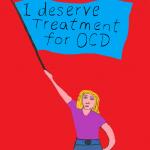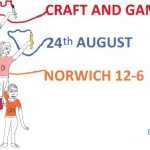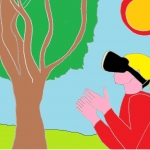My Diagnosis
August 3rd 2016
About the author: Natalie - 19 year old lover of animals and musicals, I was diagnosed with OCD at 16, but have been living with it since I can remember. Now that I finally have control over my condition, I hope to be doing some big things in the future, including getting my University Degree for Game Design and possibly moving abroad to work on my own projects or to freelance for a larger corporation. My hobbies include gaming, reading and spending time with my family
My Diagnosis
I was diagnosed with OCD at 16. I had been living with it for many years before that, but it was only now that I had found the courage to finally tell somebody. I remember my mother’s reaction when I finally said to her “Mum, is it alright if I get some counselling?” She was quite taken aback, and yet supportive. She came up behind me where I was sitting and held me, gently rocking me while she questioned me on how I was feeling. She had no idea that I had been feeling the way I was, and neither did anyone else- I had got good at hiding my true feelings from people. I didn’t think they would understand how I was feeling. After all, I didn’t understand it myself.
I have always had dark thoughts every now and again- and so does everyone else! However, my brain just couldn’t let the thoughts go. They held on to them, repeating them over and over in my head, making me question my own sanity and morality. If I was capable of thinking these things, then what kind of monster does that make me? Rather than accepting the thoughts as random and spontaneous, I was under the impression that they were signs of a much darker psyche, one of a psychopath. I was afraid of myself, of what I could do.
Sometimes I was so overcome by guilt, fear and anxiety that I would vomit. During my worst phases, I wouldn’t eat, or talk, or do anything other than lie in bed staring into space, to consumed by my inner trauma to pay any attention to the outside world. I would stay away from people, particularly people that my thoughts were centred around (like my brother, some of my best friends, my parents etc.). I would still go to school, but it was all a blur. It was strange in a way, to be surrounded by so many other people and yet feel so isolated. Again, my parents didn’t really notice my behaviour too much, thinking I was just a bit of an introvert.
Nobody knew about any of this, until I met Paul, my counsellor. Explaining all of this to Paul was one of the scariest things I had ever done. I was sure that he would think of me as insane and dangerous, but he just sat, nodding, with a sympathetic and understanding look in his eyes. When I had finished talking, he invited my mum into the room. This frightened me even more. He would surely tell her everything that I had just said. How would she react to find out that her daughter was a monster? Fortunately, this was not what happened.
Instead, Paul looked at me, and said that he didn’t think I looked like an evil madwoman capable of acting on whatever dark thoughts were consuming my mind. He told me that he thought I was suffering with OCD.
But surely this couldn’t be the case? I’m a very messy person. I hate cleaning and chores. My bedroom is usually a tip.
What I didn’t know is that what most people think of when they hear OCD is a gross misrepresentation of what the condition actually entails. When Paul explained to me what the condition really was, everything started to make sense. It was relieving to know that there was a reason behind what I was feeling, and to know that I was not alone.
By the end of the session, I was happy. Paul had given me a prescription for a drug called Sertraline, which would help my condition and allow me to control my OCD until I started my CBT courses with my other counsellor Claire. I went home that day and spent hours on the internet researching OCD, looking at the stories that other sufferers told and seeing similarities with mine. The more I began to understand the disorder, the better I felt about it. I finally realised that I wasn’t a bad person, that these thoughts, or “obsessions” didn’t really mean anything, and that it actually meant that I cared immensely about the people around me, and that I was one of the least likely people to ever actually do the things I was thinking about. It finally seemed like there would be an end to my struggle, a light at the end of an extremely long, dark tunnel.
And now, over three years later, I’m proud to say that, while I haven’t fully beaten my condition, I am a much happier and confident person. Every now and then I relapse into another OCD phase, but my family can now recognise it, and are very supportive. These phases, when they do occur, have now become much shorter and much fewer and farther in between. I am slowly weaning myself off of the drugs, which I’m very happy about, and I am a lot more social and enjoy being around people a lot more than I did previously. I will be attending university in September, and I am actually really looking forward to what the future holds for me.
But it still bothers me that there are so many other people who, like me, suffer with OCD without even realising it. It also bothers me to know that people don’t really understand what OCD actually is, and use is as an adjective to describe neatness or cleanliness in passing (“I’m so OCD! I clean all of the time!”). I feel that this is why a lot of people don’t realise that they themselves might actually have OCD, as they don’t really know what it actually is. Even my GP didn’t really know what the condition was, telling me he didn’t think my symptoms sounded like OCD, as OCD is washing your hands excessively or being particularly neat. That’s why it’s so important to try and educate people and to set the record straight. OCD is a real mental condition that can absolutely ruin people’s lives. It isn’t a joke, and it isn’t an adjective to describe your finicky little quirks, it’s a soul crushing and emotionally crushing condition that people are really suffering through.







